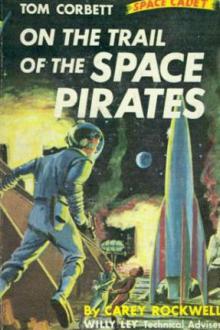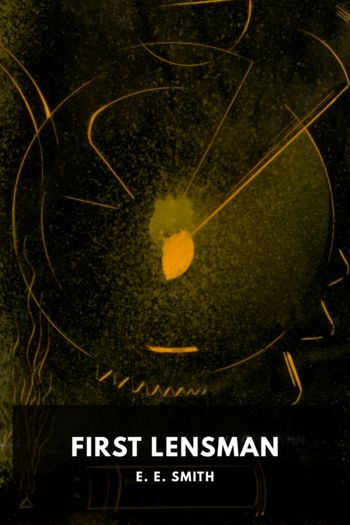Triplanetary - E. E. Smith (phonics reader TXT) 📗

- Author: E. E. Smith
Book online «Triplanetary - E. E. Smith (phonics reader TXT) 📗». Author E. E. Smith
“It worked,” Cleveland smiled wanly as he recovered sufficiently to speak, then leaped to his feet. “Snap it up, Fred! We must be falling fast—we’ll be wrecked when we hit!”
“We’re not falling anywhere.” Rodebush, foreboding in his eyes, walked over to the main observation plate and scanned the heavens. “However, it’s not as bad as I was afraid it might be. I can still recognize a few of the constellations, even though they are all pretty badly distorted. That means that we can’t be more than a couple of light-years or so away from the Solar System. Of course, since we had so little thrust on, practically all of our energy and time was taken up in getting out of the atmosphere. Even at that, though, it’s a good thing that space isn’t a perfect vacuum, or we would have been clear out of the Universe by this time.”
“Huh? What are you talking about? Impossible! Where are we, anyway? Then we must be making mil. … Oh, I see!” Cleveland exclaimed, somewhat incoherently, as he also stared into the plate.
“Right. We aren’t traveling at all—now.” Rodebush replied. “We are perfectly stationary relative to Tellus, since we made that hop without inertia. We must have attained one hundred percent neutralization—one hundred point oh oh oh oh oh—which we didn’t quite expect. Therefore we must have stopped instantaneously when our inertia was restored. Incidentally, that original, pre-inertialess velocity ‘intrinsic’ velocity, suppose we could call it?—is going to introduce plenty of complications, but we don’t have to worry about them right now. Also, it isn’t where we are that is worrying me—we can get fixes on enough recognizable stars to find that out in short order—it’s when.”
“That’s right, too. Say we’re two light years away from home. You think maybe that we’re two years older now than we were ten minutes ago? Interesting no end—and distinctly possible. Maybe even probable—I wouldn’t know—there’s been a lot of discussion on that theory, and as far as I know we’re the first ones who ever had a chance to prove or disprove it absolutely. Let’s snap back to Tellus and find out, right now.”
“We’ll do that, after a little more experimenting. You see, I had no intention of giving us such a long push. I was going to throw the switches in and out, but you know what happened. However, there’s one good thing about it—it’s worth two years of anybody’s life to settle that relativity-time thing definitely, one way or the other.”
“I’ll say it is. But say, we’ve got a lot of power on our ultra-wave; enough to reach Tellus, I think. Let’s locate the sun and get in touch with Samms.”
“Let’s work on these controls a little first, so we’ll have something to report. Out here’s a fine place to try the ship out—nothing in the way.”
“All right with me. But I would like to find out whether I’m two years older than I think I am, or not!”
Then for four hours they put the great super-ship through her paces, just as test-pilots check up on every detail of performance of an airplane of new and radical design. They found that the horrible vertigo could be endured, perhaps in time even conquered as space-sickness could be conquered, by a strong will in a sound body; and that their new conveyance had possibilities of which even Rodebush had never dreamed. Finally, their most pressing questions answered, they turned their most powerful ultra-beam communicator toward the yellowish star which they knew to be Old Sol.
“Samms … Samms.” Cleveland spoke slowly and distinctly. “Rodebush and Cleveland reporting from the ‘Space-Eating Wampus,’ now directly in line with Beta Ursae Minoris from the sun, distance about two point two light years. It will take six bands of tubes on your tightest beam, LSV3, to reach us. Barring a touch of an unusually severe type of space-sickness, everything worked beautifully; even better than either of us dared to believe. There’s something we want to know right away—have we been gone four hours and some odd minutes, or better than two years?”
He turned to Rodebush and went on:
“Nobody knows how fast this ultra-wave travels, but if it goes as fast as we did coming out it’s no creeper. I’ll give him about thirty minutes, then shoot in another. …”
But, interrupting Cleveland’s remark, the care-ravaged face of Virgil Samms appeared sharp and clear upon the plate and his voice snapped curtly from the speaker.
“Thank God you’re alive, and twice that that the ship works!” he exclaimed. “You’ve been gone four hours, eleven minutes, and forty one seconds, but never mind about abstract theorizing. Get back here, to Pittsburgh, as fast as you can drive. That Nevian vessel or another one like her is mopping up the city, and has destroyed half the Fleet already!”
“We’ll be back there in nine minutes!” Rodebush snapped into the transmitter. “Two to get from here to atmosphere, four from Atmosphere down to the Hill, and three to cool off. Notify the full four-shift crew—everybody we’ve picked out. Don’t need anybody else. Ship, equipment, and armament are ready!”
“Two minutes to atmosphere? Think you can do it?” Cleveland asked, as Rodebush flipped off the power and leaped to the control panel. “You might, though, at that.”
“We could do it in less than that if we had to. We used scarcely any power at all coming out, and I’m going to use quite a lot going back,” the physicist explained rapidly, as he set the dials which would determine their flashing course.
The master switches were thrown and the pangs of inertialessness again assailed them—but weaker far this time than ever before—and upon their lookout plates





Comments (0)